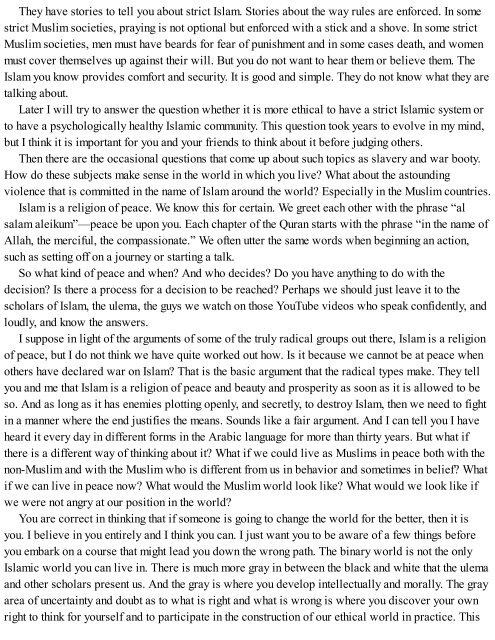1250119847
Create successful ePaper yourself
Turn your PDF publications into a flip-book with our unique Google optimized e-Paper software.
They have stories to tell you about strict Islam. Stories about the way rules are enforced. In some<br />
strict Muslim societies, praying is not optional but enforced with a stick and a shove. In some strict<br />
Muslim societies, men must have beards for fear of punishment and in some cases death, and women<br />
must cover themselves up against their will. But you do not want to hear them or believe them. The<br />
Islam you know provides comfort and security. It is good and simple. They do not know what they are<br />
talking about.<br />
Later I will try to answer the question whether it is more ethical to have a strict Islamic system or<br />
to have a psychologically healthy Islamic community. This question took years to evolve in my mind,<br />
but I think it is important for you and your friends to think about it before judging others.<br />
Then there are the occasional questions that come up about such topics as slavery and war booty.<br />
How do these subjects make sense in the world in which you live? What about the astounding<br />
violence that is committed in the name of Islam around the world? Especially in the Muslim countries.<br />
Islam is a religion of peace. We know this for certain. We greet each other with the phrase “al<br />
salam aleikum”—peace be upon you. Each chapter of the Quran starts with the phrase “in the name of<br />
Allah, the merciful, the compassionate.” We often utter the same words when beginning an action,<br />
such as setting off on a journey or starting a talk.<br />
So what kind of peace and when? And who decides? Do you have anything to do with the<br />
decision? Is there a process for a decision to be reached? Perhaps we should just leave it to the<br />
scholars of Islam, the ulema, the guys we watch on those YouTube videos who speak confidently, and<br />
loudly, and know the answers.<br />
I suppose in light of the arguments of some of the truly radical groups out there, Islam is a religion<br />
of peace, but I do not think we have quite worked out how. Is it because we cannot be at peace when<br />
others have declared war on Islam? That is the basic argument that the radical types make. They tell<br />
you and me that Islam is a religion of peace and beauty and prosperity as soon as it is allowed to be<br />
so. And as long as it has enemies plotting openly, and secretly, to destroy Islam, then we need to fight<br />
in a manner where the end justifies the means. Sounds like a fair argument. And I can tell you I have<br />
heard it every day in different forms in the Arabic language for more than thirty years. But what if<br />
there is a different way of thinking about it? What if we could live as Muslims in peace both with the<br />
non-Muslim and with the Muslim who is different from us in behavior and sometimes in belief? What<br />
if we can live in peace now? What would the Muslim world look like? What would we look like if<br />
we were not angry at our position in the world?<br />
You are correct in thinking that if someone is going to change the world for the better, then it is<br />
you. I believe in you entirely and I think you can. I just want you to be aware of a few things before<br />
you embark on a course that might lead you down the wrong path. The binary world is not the only<br />
Islamic world you can live in. There is much more gray in between the black and white that the ulema<br />
and other scholars present us. And the gray is where you develop intellectually and morally. The gray<br />
area of uncertainty and doubt as to what is right and what is wrong is where you discover your own<br />
right to think for yourself and to participate in the construction of our ethical world in practice. This
















